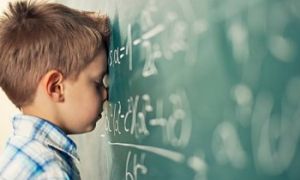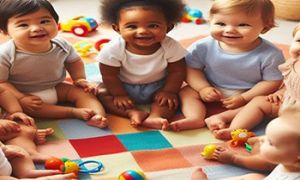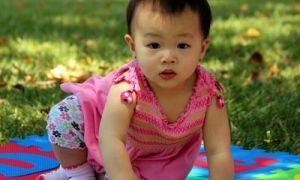

Painting with toddlers and preschoolers can be a wonderful and enriching activity. It not only stimulates their creativity but also supports their overall development. The following article provides information on the Benefits Of Painting, Appropriate Painting Materials and Resources For Children, Painting Experiences With Toddlers, Painting Experiences For Toddlers, Painting Experiences For Preschoolers, Linking To The EYLF and more.
Achieving EYLF Outcome 2: Children Are Connected With And Contribute To Their World in the babies' room developing a sense of connectedness and contribution to their world. The following article provides information on Strategies To Achieve Outcome 2 With Babies, Goals For Babies To Acheive EYLF Outcome 2, Example Activities That Link With Outcome 2 For Babies, and more.
Achieving EYLF Outcome 1: Children have a strong sense of identity in the babies' room involves creating an environment where each child feels safe, secure, and supported. The following article provides information on Strategies To Achieve Outcome 1 With Babies, Goals For Babies To Acheive EYLF Outcome 1, Example Activities That Link With Outcome 1 For Babies, and more.
EYLF Learning Outcome 3 focuses on "Children Have A Strong Sense Of Wellbeing." The following article provides information on Key Learning Goals, Strategies To Support Learning Goals, Activities That Link To EYLF Learning Outcome 3, Lesson Plan Sample For EYLF Outcome 3, and more.
EYLF Learning Outcome 2 focuses on "Children Are Connected With And Contribute To Their World." The following article provides information on Key Learning Goals, Strategies To Support Learning Goals, Activities That Link To EYLF Learning Outcome 2, Lesson Plan Sample For EYLF Outcome 2 and more.
EYLF Learning Outcome 1 - Children Have A Strong Sense Of Identity focuses on children developing a strong sense of identity. The following article provides information on Key Learning Goals, Strategies To Support Learning Goals, Activities That Link To EYLF Learning Outcome 1, Lesson Plan Sample For EYLF Outcome 1 and more.
Developmental milestones are things that, by a given age, most kids can accomplish. Milestones are reached by children in their play, learning, speaking, acting, and moving. The following article provides Developmental Milestones 2 - 3 Years Old with Examples Of Links To The EYLF.
Having a solid grasp of developmental stages will help you evaluate children's play and learning effectively. Sound professional knowledge should serve as the foundation for intentional teaching, planning, and evaluation. The following article provides Developmental Milestones 1 - 2 Years Old with Examples Of Links To The EYLF.
This template is used as a checklist to attach to documentation with a list of all the sub-outcomes for each of the EYLF Learning Outcomes Version 2.0.
The EYLF Learning Outcomes are broad and observable. They acknowledge that children learn in a variety of ways and vary in their capabilities and pace of learning. Children’s learning is ongoing acknowledge that children learn in a variety of ways. The following article provides practical examples of each individual learning outcome that children will progress towards in different and equally meaningful ways.
 Toddlers have a greater understanding of the world around them by this stage. Their cognitive development (also known as intellectual development and thinking skills) continues… Read More
Toddlers have a greater understanding of the world around them by this stage. Their cognitive development (also known as intellectual development and thinking skills) continues… Read More
 Infants begin to develop trust when parents begin to fulfil their needs. Such as changing an infant's nappy when needed, feeding on request and holding… Read More
Infants begin to develop trust when parents begin to fulfil their needs. Such as changing an infant's nappy when needed, feeding on request and holding… Read More
 Beginning at birth the construction of thought processes, such as memory, problem solving, exploration of objects etc, is an important part of an infant’s cognitive… Read More
Beginning at birth the construction of thought processes, such as memory, problem solving, exploration of objects etc, is an important part of an infant’s cognitive… Read More
 Toddlers want to do more on their own and do not like it when you begin to establish limits on their behaviour. Tantrums can become… Read More
Toddlers want to do more on their own and do not like it when you begin to establish limits on their behaviour. Tantrums can become… Read More
 Your preschooler is now able to focus their attention more accurately and is less influenced by distractions. The intensity of questions increase as your child… Read More
Your preschooler is now able to focus their attention more accurately and is less influenced by distractions. The intensity of questions increase as your child… Read More
 John Dewey is often seen as the proponent of learning by doing – rather than learning by passively receiving. He believed that each child was active,… Read More
John Dewey is often seen as the proponent of learning by doing – rather than learning by passively receiving. He believed that each child was active,… Read More
 Toddler advance and gains new skills in Gross Motor Development milestones achieved throughout earlier years. Co-ordination and challenges that could not be performed before such… Read More
Toddler advance and gains new skills in Gross Motor Development milestones achieved throughout earlier years. Co-ordination and challenges that could not be performed before such… Read More
 Erik Erikson developed a psychosocial theory to understand how we each develop our identities through eight stages of psychosocial development from infancy to adulthood. The… Read More
Erik Erikson developed a psychosocial theory to understand how we each develop our identities through eight stages of psychosocial development from infancy to adulthood. The… Read More
 At this point preschoolers begin to interact effectively with others. Play becomes more innovative and organized and “boyfriend” or “girlfriend” begins to emerge. Preschoolers have… Read More
At this point preschoolers begin to interact effectively with others. Play becomes more innovative and organized and “boyfriend” or “girlfriend” begins to emerge. Preschoolers have… Read More
 From now, babies begin to identify and respond to their own feelings, understanding other's feelings & needs and interact positively with others. A baby's social and… Read More
From now, babies begin to identify and respond to their own feelings, understanding other's feelings & needs and interact positively with others. A baby's social and… Read More

It is not uncommon for educators to confide that transitions tend to be the most...
See more...
Caring for babies in their gross motor development stage involves encouraging activities that promote strength...
See more...
Babies will begin to find new ways of moving themselves around the house and has...
See more...© 2009-2025 Aussie Childcare Network Pty Ltd. All Rights Reserved.
